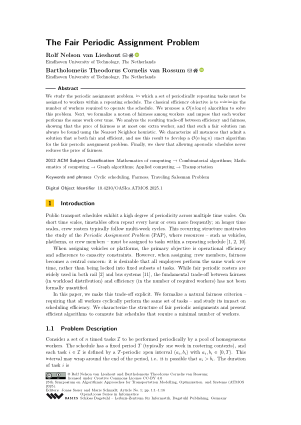The Fair Periodic Assignment Problem
Authors
Rolf Nelson van Lieshout  ,
Bartholomeüs Theodorus Cornelis van Rossum
,
Bartholomeüs Theodorus Cornelis van Rossum 
-
Part of:
Volume:
25th Symposium on Algorithmic Approaches for Transportation Modelling, Optimization, and Systems (ATMOS 2025)
Part of: Series: Open Access Series in Informatics (OASIcs)
Part of: Conference: Symposium on Algorithmic Approaches for Transportation Modelling, Optimization, and Systems (ATMOS) - License:
 Creative Commons Attribution 4.0 International license
Creative Commons Attribution 4.0 International license
- Publication Date: 2025-10-17
File

PDF
OASIcs.ATMOS.2025.1.pdf
- Filesize: 0.88 MB
- 16 pages
Document Identifiers
Subject Classification
ACM Subject Classification
- Mathematics of computing → Combinatorial algorithms
- Mathematics of computing → Graph algorithms
- Applied computing → Transportation
Keywords
- Cyclic scheduling
- Fairness
- Traveling Salesman Problem
Metrics
- Access Statistics
-
Total Accesses (updated on a weekly basis)
0PDF Downloads0Metadata Views
Abstract
We study the periodic assignment problem, in which a set of periodically repeating tasks must be assigned to workers within a repeating schedule. The classical efficiency objective is to minimize the number of workers required to operate the schedule. We propose a 𝒪(n log n) algorithm to solve this problem. Next, we formalize a notion of fairness among workers, and impose that each worker performs the same work over time. We analyze the resulting trade-off between efficiency and fairness, showing that the price of fairness is at most one extra worker, and that such a fair solution can always be found using the Nearest Neighbor heuristic. We characterize all instances that admit a solution that is both fair and efficient, and use this result to develop a 𝒪(n log n) exact algorithm for the fair periodic assignment problem. Finally, we show that allowing aperiodic schedules never reduces the price of fairness.
Cite As Get BibTex
Rolf Nelson van Lieshout and Bartholomeüs Theodorus Cornelis van Rossum. The Fair Periodic Assignment Problem. In 25th Symposium on Algorithmic Approaches for Transportation Modelling, Optimization, and Systems (ATMOS 2025). Open Access Series in Informatics (OASIcs), Volume 137, pp. 1:1-1:16, Schloss Dagstuhl – Leibniz-Zentrum für Informatik (2025)
https://doi.org/10.4230/OASIcs.ATMOS.2025.1
BibTex
@InProceedings{vanlieshout_et_al:OASIcs.ATMOS.2025.1,
author = {van Lieshout, Rolf Nelson and van Rossum, Bartholome\"{u}s Theodorus Cornelis},
title = {{The Fair Periodic Assignment Problem}},
booktitle = {25th Symposium on Algorithmic Approaches for Transportation Modelling, Optimization, and Systems (ATMOS 2025)},
pages = {1:1--1:16},
series = {Open Access Series in Informatics (OASIcs)},
ISBN = {978-3-95977-404-8},
ISSN = {2190-6807},
year = {2025},
volume = {137},
editor = {Sauer, Jonas and Schmidt, Marie},
publisher = {Schloss Dagstuhl -- Leibniz-Zentrum f{\"u}r Informatik},
address = {Dagstuhl, Germany},
URL = {https://drops.dagstuhl.de/entities/document/10.4230/OASIcs.ATMOS.2025.1},
URN = {urn:nbn:de:0030-drops-247574},
doi = {10.4230/OASIcs.ATMOS.2025.1},
annote = {Keywords: Cyclic scheduling, Fairness, Traveling Salesman Problem}
}
Author Details
References
- Enrico Bortoletto, Rolf N van Lieshout, Berenike Masing, and Niels Lindner. Periodic Event Scheduling with Flexible Infrastructure Assignment. In 24th Symposium on Algorithmic Approaches for Transportation Modelling, Optimization, and Systems (ATMOS 2024), volume 123 of Open Access Series in Informatics (OASIcs), pages 4:1-4:18, Dagstuhl, Germany, 2024. Schloss Dagstuhl - Leibniz-Zentrum für Informatik. URL: https://doi.org/10.4230/OASIcs.ATMOS.2024.4.
- Thomas Breugem, Twan Dollevoet, and Dennis Huisman. Is equality always desirable? Analyzing the trade-off between fairness and attractiveness in crew rostering. Management Science, 68(4):2619-2641, 2022. URL: https://doi.org/10.1287/mnsc.2021.4005.
- Rainer E Burkard, Vladimir G Deineko, Rene Van Dal, Jack AA van der Veen, and Gerhard J Woeginger. Well-solvable special cases of the traveling salesman problem: A survey. SIAM Review, 40(3):496-546, 1998. URL: https://doi.org/10.1137/S0036144596297514.
- Héloïse Gachet and Frédéric Meunier. Balanced Assignments of Periodic Tasks. In Paul C. Bouman and Spyros C. Kontogiannis, editors, 24th Symposium on Algorithmic Approaches for Transportation Modelling, Optimization, and Systems (ATMOS 2024), volume 123 of Open Access Series in Informatics (OASIcs), pages 5:1-5:12, Dagstuhl, Germany, 2024. Schloss Dagstuhl - Leibniz-Zentrum für Informatik. URL: https://doi.org/10.4230/OASIcs.ATMOS.2024.5.
- Héloïse Gachet and Frédéric Meunier. Balanced assignments of periodic tasks. CoRR, 2025. URL: https://arxiv.org/abs/2407.05485.
- Gupta, Lee, and Leung. An optimal solution for the channel-assignment problem. IEEE Transactions on Computers, C-28(11):807-810, 1979. URL: https://doi.org/10.1109/TC.1979.1675260.
- Jan H. M. Korst, Emile H. L. Aarts, Jan Karel Lenstra, and Jaap Wessels. Periodic assignment and graph colouring. Discrete Applied Mathematics, 51(3):291-305, 1994. URL: https://doi.org/10.1016/0166-218X(92)00036-L.
- Eugene Levner, Vladimir Kats, David Alcaide López de Pablo, and T.C.E. Cheng. Complexity of cyclic scheduling problems: A state-of-the-art survey. Computers & Industrial Engineering, 59(2):352-361, 2010. URL: https://doi.org/10.1016/j.cie.2010.03.013.
- James B Orlin. Minimizing the number of vehicles to meet a fixed periodic schedule: An application of periodic posets. Operations Research, 30(4):760-776, 1982. URL: https://doi.org/10.1287/OPRE.30.4.760.
- Rolf N van Lieshout. Integrated periodic timetabling and vehicle circulation scheduling. Transportation Science, 55(3):768-790, 2021. URL: https://doi.org/10.1287/trsc.2020.1024.
- Lin Xie and Leena Suhl. Cyclic and non-cyclic crew rostering problems in public bus transit. OR Spectrum, 37:99-136, 2015. URL: https://doi.org/10.1007/s00291-014-0364-9.
